 What makes a great coach?
What makes a great coach?
Coaching isn’t just for people like me who coach businesses. It’s embraces every leader and manager.
In Be a Catalyst to Others, Gregg Thompson – St Louis Scale Up Summit we outlined Gregg Thompson’s presentation, sharing the nature of being a catalyst by asking great questions.
Great Coaching Characteristics
Here are eight characteristics Gregg Thompson offered as great coaching skills. (I’ve provided a short definition to each characteristic based on my 30+ years of coaching experience)
- Recognize that the other person is a unique individual with a unique
 personality and set of values. One size does not fit all. Discovering what makes each team member tick, requires patience, listening, learning, and adopting to non-formulaic methods. Each individual you coach requires a personal touch to bring out their best, and to help them realize the potential they might not see in themselves. Your ability to see them uniquely opens the door to their unique potential.
personality and set of values. One size does not fit all. Discovering what makes each team member tick, requires patience, listening, learning, and adopting to non-formulaic methods. Each individual you coach requires a personal touch to bring out their best, and to help them realize the potential they might not see in themselves. Your ability to see them uniquely opens the door to their unique potential. - Assume the other person is resourceful, talented and fully capable of managing their own job, career and life. When you believe the best in others, people tend to live up to your expectations, even it their unspoken. Read Your Expectations Impact You and Your Team
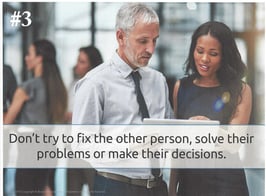 Don’t try to fix the other person, solve their problems or make their decisions. Fixing someone else’s problems or making decisions for them, make them dependent upon you. Worse yet it robs them of the confidence they receive from doing it themselves. Read The Problem with being the Chief Problem Solver Also read A Hero In Your Business Is a Problem
Don’t try to fix the other person, solve their problems or make their decisions. Fixing someone else’s problems or making decisions for them, make them dependent upon you. Worse yet it robs them of the confidence they receive from doing it themselves. Read The Problem with being the Chief Problem Solver Also read A Hero In Your Business Is a Problem- Keep one overriding thought in mind at all times. “Right now, what is the most potent thing I can say to be helpful to the other person?” The power is in the moment. You can’t affect the past, the only way to affect the future is in the moment. This question is a version of the One Thing Question, only focused on your one on one coaching meeting: What’s the One Thing I can do, such that by doing it, it would make everything easier or unnecessary for this individual? Read The Anatomy of THE ONE THING QUESTION: Build a Success Habit
- Listen for aspirations, emotions, passions, inconsistencies, possibilities
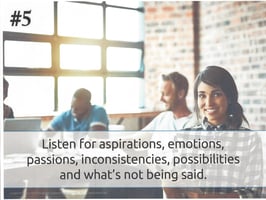 and what’s not being said. Listen. Why is it we fail to take the time to listen to the people who are most important to our success and our relationships. If you have difficult listening, I’ve found one key really helps. It’s simply repeating what the person said. Feed it back to them in your words to make sure you understand. Often this step helps you to digest their meaning. Reflecting, by taking notes of your meeting also contributes to being a better coach. Often, in the moment, you are so engaged you miss the real meaning and intention. Upon reflection you understand context better and can be more helpful in directing them to what truly inspires performance.
and what’s not being said. Listen. Why is it we fail to take the time to listen to the people who are most important to our success and our relationships. If you have difficult listening, I’ve found one key really helps. It’s simply repeating what the person said. Feed it back to them in your words to make sure you understand. Often this step helps you to digest their meaning. Reflecting, by taking notes of your meeting also contributes to being a better coach. Often, in the moment, you are so engaged you miss the real meaning and intention. Upon reflection you understand context better and can be more helpful in directing them to what truly inspires performance. 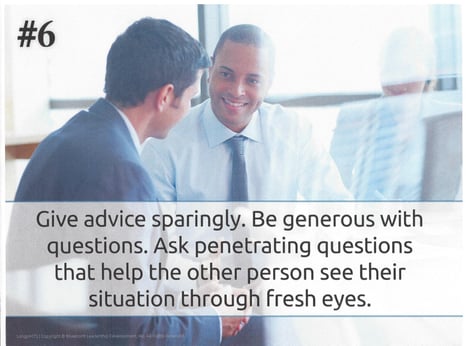 Give advice sparingly. Be generous with questions. Ask penetrating questions that help the other person see their situation through fresh eyes. Gregg Thompson’s presentation was peppered with questions versus advice. He practices what he preaches. Kaihan Krippendorff in Outthink the Competition refers to this quote from Albert Einstein, “If I had 60 minutes to solve a problem, and my life depended upon the answer, I’d spend 55 minutes deciding what question to ask. Because when I have the right question, I can solve it in 5 minutes.” When the person you are coaching, discovers the answer, they remember it. Best of all it empowers them!
Give advice sparingly. Be generous with questions. Ask penetrating questions that help the other person see their situation through fresh eyes. Gregg Thompson’s presentation was peppered with questions versus advice. He practices what he preaches. Kaihan Krippendorff in Outthink the Competition refers to this quote from Albert Einstein, “If I had 60 minutes to solve a problem, and my life depended upon the answer, I’d spend 55 minutes deciding what question to ask. Because when I have the right question, I can solve it in 5 minutes.” When the person you are coaching, discovers the answer, they remember it. Best of all it empowers them!- Watch for and seize opportunities to affirm, challenge, encourage and
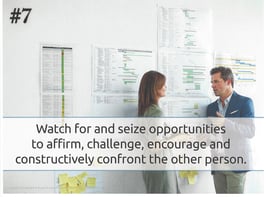 constructively confront the other person. The very best book I know on building the right habit of positive reinforcement is Aubrey Daniels’ Bringing Out the Best In People. Read PIC – Positive Immediate Consequence – Aubrey Daniels – Dallas Growth Summit, Positive Reinforcement – What & How You Say It (Biopsy Results), 4 Rules of Positive Reinforcement and Positive Reinforcement: 4 Steps to “Make Others Feel Important” (1&2). In terms of constructively confronting others you may find the Conflict Resolution Model in Leadership Harmony – 5 Dysfunctions of a Team – Conflict Resolution Model
constructively confront the other person. The very best book I know on building the right habit of positive reinforcement is Aubrey Daniels’ Bringing Out the Best In People. Read PIC – Positive Immediate Consequence – Aubrey Daniels – Dallas Growth Summit, Positive Reinforcement – What & How You Say It (Biopsy Results), 4 Rules of Positive Reinforcement and Positive Reinforcement: 4 Steps to “Make Others Feel Important” (1&2). In terms of constructively confronting others you may find the Conflict Resolution Model in Leadership Harmony – 5 Dysfunctions of a Team – Conflict Resolution Model - Seek to help the other person advance their performance, learning and development whenever possible. This might be the best definition for being a great coach.
If you’d like to get all 8 of these characteristics in picture form download them here, 8 Characteristics of Great Coaches.
Would you like to ask better questions in your one on one coaching meetings with your team? Download Gregg Thompson’s The 60 Big Coaching Questions. Thompson’s questions are broken into three categories, Discovery: Exploration and learning, Creation: Possibilities & Opportunities, and Commitment: Action & execution. These three categories help you select the proper question to guide you to help your team to breakthroughs in their performance.
Are you avoiding a conversation with yourself on how you can grow your business? We are experts at coaching your business to scale up! Contact dwick@positioningsystems.com. Or take our Four Decisions Needs Assessment to discover how your business measures against other Scaled Up companies. We’ll contact you.
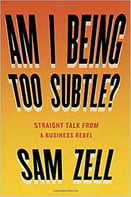 Am I Being Too Subtle
Am I Being Too Subtle
Sam Zell, author of Am I Being Too Subtle, Founder, Chairman, Equity Group Investments (5 companies on the NY Stock Exchange) and chosen as one of Forbes 100 greatest business minds, considers himself a professional risk-taker. We’ll discover his theory on risk, what real partnership is and what he feels is the biggest opportunity in real estate today. That’s next blog.






.jpeg?width=150&height=135&name=Hand%20with%20marker%20writing%20the%20question%20Whats%20Next_%20(1).jpeg)

